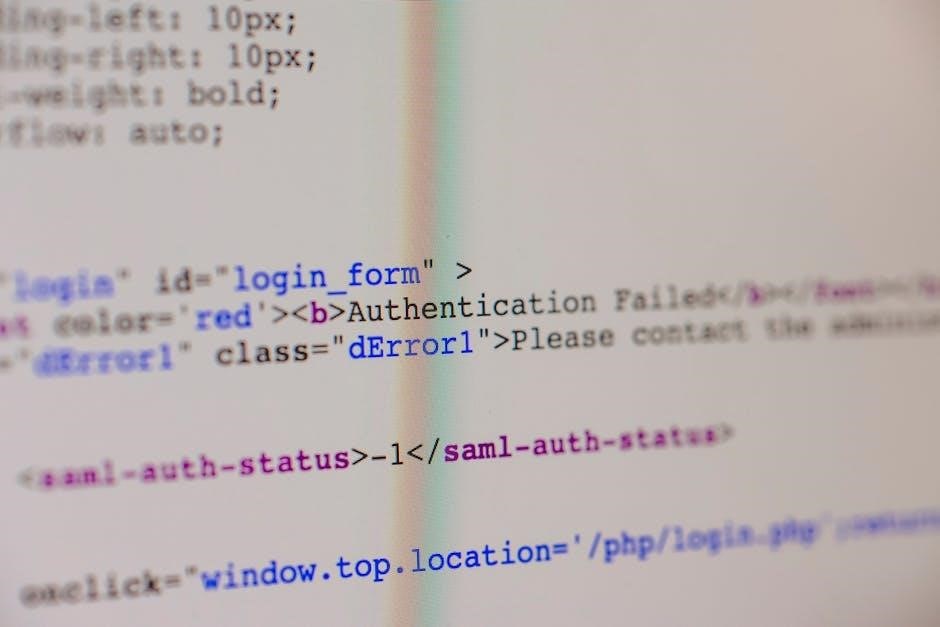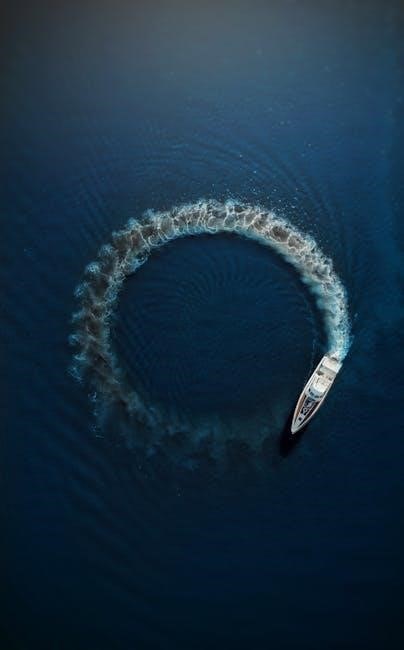The Navy Urinalysis Program ensures military readiness by testing all personnel for drug use, maintaining discipline and health through the NDSP and forensic labs.
1.1. Purpose of the Program
The Navy Urinalysis Program aims to ensure military readiness by detecting drug use, maintaining good order, and discipline. It ensures personnel are fit for duty, free from illegal substances, and capable of performing their roles safely and effectively. The program also serves to deter drug use and uphold the Navy’s zero-tolerance policy. By conducting random and scheduled tests, it identifies individuals needing assistance and enforces accountability. This supports mission success and protects the health and safety of all service members. A positive result triggers disciplinary actions and rehabilitation efforts to maintain unit integrity and operational effectiveness.
1.2. Key Components of the Urinalysis Program
The program includes mandatory participation for all personnel, with annual testing requirements and random sampling. It involves urine specimen collection, secure handling, and transportation to forensic labs. The NDSP manages testing, while UPCs coordinate collections and ensure compliance. Results are reviewed for accuracy, with positive tests confirmed through advanced methods. Command leadership oversees the process, ensuring integrity and adherence to regulations. Training and education are provided to staff, and quality assurance measures maintain program effectiveness. These components work together to support the Navy’s mission and readiness goals.
1.3. Importance of the Program in Maintaining Military Readiness
The Navy Urinalysis Program is crucial for ensuring a fit and disciplined force. It identifies substance abuse issues, preventing impaired judgment and operational risks. By maintaining a drug-free environment, the program safeguards national security and mission success. It also promotes health and well-being, enabling personnel to perform at peak readiness levels. The program’s effectiveness is essential for upholding the Navy’s zero-tolerance policy, ensuring unit cohesion, and maintaining public trust in military capabilities. Its impact extends to individual careers and overall force preparedness.

Administration of the Navy Urinalysis Program
The program is overseen by the Urinalysis Program Coordinator (UPC) and Assistant UPCs, ensuring compliance with Navy Drug Screening Program (NDSP) policies and procedures.
2.1. Roles and Responsibilities of the Urinalysis Program Coordinator (UPC)
The Urinalysis Program Coordinator (UPC) is responsible for managing the Navy’s drug testing program, ensuring compliance with policies, and conducting regular urinalysis screenings. The UPC oversees the collection, handling, and testing of urine samples, maintaining accurate records and ensuring confidentiality. They also provide training to personnel, handle positive test results, and coordinate with forensic laboratories. The UPC plays a critical role in maintaining military readiness and upholding the Navy’s zero-tolerance policy on drug use. Their duties are essential for sustaining discipline and operational integrity.
2.2. Duties of Assistant Urinalysis Program Coordinators (AUPCs)
Assistant Urinalysis Program Coordinators (AUPCs) support the UPC in managing the drug testing program. Their duties include coordinating urinalysis testing, ensuring sample integrity, and maintaining accurate records; AUPCs assist with training personnel, handling test results, and ensuring compliance with Navy regulations. They also help monitor testing schedules and provide support during inspections. AUPCs play a key role in ensuring the program’s efficiency and accuracy, upholding the Navy’s drug-free policy and contributing to overall mission readiness.
2.3. Command Leadership’s Role in Program Oversight
Command leadership plays a critical role in overseeing the Navy Urinalysis Program, ensuring compliance with policies and procedures; Leaders enforce the Navy’s zero-tolerance drug policy, review testing results, and address disciplinary actions. They ensure the program maintains credibility and integrity, supporting mission readiness. Command leaders also oversee the UPC and AUPCs, providing guidance and resources to ensure effective program execution. Their involvement in inspections and audits helps validate the accuracy of testing processes, reinforcing the Navy’s commitment to a drug-free environment and operational excellence.

Urinalysis Program Participation and Testing Frequency
All Navy personnel are required to participate in the urinalysis program, with a minimum of one test annually. Testing includes both random and scheduled screenings to ensure compliance.
3.1. Mandatory Participation for All Personnel
Mandatory participation in the Navy Urinalysis Program is required for all active-duty, reserve, and civilian personnel. This ensures a drug-free environment, upholding military readiness and discipline. Personnel must provide urine samples as directed, with no exceptions. Compliance is enforced through random and scheduled testing, promoting fairness and accountability. Refusal to participate results in disciplinary action, reflecting the Navy’s zero-tolerance policy on drug use. This requirement is non-negotiable, ensuring unit cohesion and operational safety are maintained at all times.
3.2. Minimum Annual Testing Requirements
All Navy personnel are required to undergo urinalysis testing at least once annually. Commands must ensure that a minimum of 10% to 20% of their personnel are tested monthly. This ensures consistent and fair drug screening across the fleet. Testing frequency is randomized to avoid predictability, enhancing the deterrent effect. The program aligns with the Navy’s zero-tolerance policy on drug use, ensuring operational readiness and unit safety. Annual testing guarantees that all members are held to the same standards, maintaining discipline and accountability throughout the year.
3.3. Random and Scheduled Testing Procedures
The Navy employs both random and scheduled urinalysis tests to ensure fairness and deter drug use. Random testing uses NDSP software to select individuals without prior notice, while scheduled tests target specific groups like new arrivals or safety-sensitive roles. Commands must test new personnel within 72 hours of reporting and may increase frequency for high-risk units. This dual approach ensures compliance with the Navy’s zero-tolerance policy, maintaining readiness and discipline. Regular, unpredictable testing reinforces accountability and supports a drug-free environment across all commands.

Urinalysis Testing Process
The process involves collecting urine samples, handling them securely, and shipping to forensic labs for analysis. NDSP and BUMED oversee testing for accuracy and quality assurance.
4.1. Collection of Urine Samples
The collection process is supervised by the Urinalysis Program Coordinator (UPC) or Assistant UPCs, ensuring samples are gathered securely. Personnel provide specimens in private but observed settings. Samples are stored in tamper-evident containers with secure lids. A Chain of Custody form (DD Form 2624) accompanies each sample. Random selection ensures fairness, while direct observation prevents tampering. Proper handling and documentation are critical to maintaining specimen integrity and compliance with Navy protocols. This step is vital for accurate testing and program credibility.
4.2. Handling and Transportation of Samples
After collection, urine samples are stored in tamper-evident containers with secure lids and labeled with the donor’s ID. The Chain of Custody form (DD Form 2624) accompanies each sample. Samples are shipped to forensic laboratories via approved carriers, ensuring integrity and security. Proper packaging prevents contamination or leakage. Transportation adheres to Navy and DoD protocols, maintaining the chain of custody. This process ensures accurate testing and compliance with program standards, safeguarding the integrity of the urinalysis program.
4.3. Shipping Procedures for Samples
Urinalysis samples are shipped to forensic laboratories using approved carriers, ensuring secure and timely delivery. Samples must be packaged in tamper-evident containers with secure seals to prevent contamination. The Chain of Custody form (DD Form 2624) accompanies each shipment, documenting sample integrity. Shipping adheres to Navy and DoD regulations, with samples sent via certified mail or courier services. Proper labeling and packaging ensure compliance with safety and biohazard standards, maintaining the integrity of the testing process and supporting accurate results.

Testing Methodology and Program Elements
The Navy employs advanced urinalysis testing methodologies, including immunoassay and gas chromatography-mass spectrometry, to detect illicit substances. The program incorporates the NDSP and forensic toxicology labs for accurate results.
5.1. Types of Urinalysis Tests Conducted
The Navy conducts urinalysis tests to detect illicit drug use, primarily through immunoassay screening and confirmatory gas chromatography-mass spectrometry. These tests identify metabolites of substances like marijuana, cocaine, and amphetamines. Additional tests may target synthetic or designer drugs based on emerging trends. The program ensures accuracy by adhering to strict laboratory protocols and quality control measures. Positive results are confirmed to avoid false positives, ensuring fairness and reliability. These tests are critical for maintaining a drug-free military environment and upholding operational readiness.
5.2. Role of the Navy Drug Screening Program (NDSP)
The Navy Drug Screening Program (NDSP) oversees the execution of urinalysis testing, ensuring compliance with Department of Defense regulations; It utilizes the NDSP computer system to randomly select personnel for testing, ensuring a fair and unbiased process. The program enforces the Navy’s zero-tolerance policy by managing test schedules and results. NDSP also provides guidelines for handling positive results and ensures the integrity of the testing process. Its role is critical in maintaining a drug-free environment and upholding military readiness through consistent and accurate drug screening practices across all commands.
5.3. Use of Forensic Toxicology Laboratories
Forensic toxicology laboratories play a crucial role in the Navy Urinalysis Program by providing accurate and reliable analysis of urine samples. These laboratories use advanced techniques, such as gas chromatography-mass spectrometry (GC/MS), to confirm the presence of illicit substances. Their expertise ensures the integrity of test results, adhering to strict quality control standards. The labs also assist in resolving disputed or ambiguous results, maintaining the credibility of the program. Their work is essential for upholding the Navy’s zero-tolerance policy and ensuring the readiness of personnel through precise and unbiased testing.

Interpretation of Urinalysis Results
Urinalysis results are interpreted to determine the presence of illicit substances, ensuring accurate conclusions. Positive results trigger further confirmation and reporting procedures to maintain program integrity and readiness.
6.1. Understanding Positive and Negative Results
A positive urinalysis result indicates the presence of illicit substances, requiring confirmation through advanced testing. Negative results show no detected substances, ensuring compliance with Navy standards. Positive results trigger disciplinary actions, while negatives confirm readiness and adherence to policies. The program ensures accurate interpretations to maintain military discipline and health, with confirmatory tests conducted for positives to avoid false outcomes. This process upholds the integrity of the urinalysis program, ensuring fair and reliable results for all personnel.
6.2. Procedures for Confirming Positive Results
Positive urinalysis results undergo confirmatory testing using advanced methods like Gas Chromatography-Mass Spectrometry (GC-MS) to ensure accuracy. A Medical Officer reviews and validates results before reporting. This step prevents false positives and ensures fairness. Confirmatory tests are conducted at forensic toxicology labs, adhering to strict protocols. Once confirmed, results are documented and forwarded to command leadership for appropriate action, maintaining the integrity of the program and ensuring just outcomes for personnel.
6.3. Reporting Results to Command Leadership
Confirmed positive results are reported to command leadership through secure systems like iFTDTL, ensuring confidentiality. Commands receive detailed documentation, including DD Form 2624, for transparency. This process maintains accountability and supports disciplinary actions or rehabilitation programs, upholding military standards and readiness.

Consequences of Positive Urinalysis Results
A positive test leads to disciplinary actions, impacts career advancement, and mandates rehabilitation. Personnel may face administrative separation or reduced rank, emphasizing accountability and program compliance.
7.1. Disciplinary Actions for Positive Tests
A positive urinalysis test results in administrative actions, potentially leading to disciplinary measures such as reduction in rank, loss of security clearance, or even separation from service. Personnel may face non-judicial punishment under the Uniform Code of Military Justice (UCMJ), impacting their military career and future opportunities. Commanders are required to adhere to established protocols, ensuring fairness and consistency in handling such cases. Rehabilitation programs may be mandated to address substance abuse issues, but repeated offenses often result in more severe consequences, aligning with the Navy’s zero-tolerance policy on illicit drug use.
7.2. Rehabilitation and Counseling Programs
The Navy offers rehabilitation and counseling programs for personnel who test positive, aiming to address substance abuse and support recovery. These programs are mandatory for those identified with drug use issues and are designed to educate and assist individuals in achieving sobriety. Counseling sessions are conducted by trained professionals, focusing on behavioral change and long-term wellness. Participation is closely monitored, and successful completion can lead to reinstatement of duties. Confidentiality is maintained to protect privacy while ensuring compliance with treatment requirements, aligning with the Navy’s commitment to health and readiness.
7.3. Impact on Military Career and Advancement
A positive urinalysis result significantly impacts a service member’s career, potentially delaying promotions, affecting security clearances, and jeopardizing advancement opportunities. Mandatory rehabilitation programs must be completed, and repeated offenses may lead to administrative separation. Even after successful rehabilitation, the record of a positive test can influence future assignments and career progression. The Navy emphasizes zero tolerance for drug use, ensuring readiness and discipline within the ranks. Career consequences underscore the importance of adhering to the program’s guidelines and maintaining a drug-free status.

Training and Education
The Navy provides mandatory training for Urinalysis Program Coordinators (UPCs) and Assistant UPCs, including online courses like DAPA, ADAMS, and UPC. Annual training ensures compliance and program success.
8.1. Training Requirements for UPCs and AUPCs
UPCs and AUPCs must complete mandated training annually, including online courses like DAPA, ADAMS, and UPC. Training covers urinalysis procedures, sample handling, and legal compliance. Additional instruction focuses on program management, ensuring coordinators understand their roles in maintaining accurate testing processes and upholding Navy regulations. Annual refresher courses are required to stay updated on policy changes and testing methodologies, ensuring the integrity and effectiveness of the urinalysis program across all commands.
8.2. Availability of Online Courses (DAPA, ADAMS, UPC)
DAPA, ADAMS, and UPC courses are accessible online, providing standardized training for urinalysis program coordinators. These courses cover testing procedures, sample handling, and regulatory compliance. Personnel can enroll via their Common Access Card (CAC) login, with detailed instructions available on the Training page. Completion of these courses is mandatory for certification and ensures coordinators are well-versed in program requirements, enabling effective management of the Navy’s drug testing initiatives.
8.3. Educational Resources for Personnel
Personnel can access educational resources like guidebooks, policy updates, and training materials to understand the urinalysis program. These resources include NAVMED 5350/5 for program reviews and reports, ensuring compliance with testing methodologies and collection procedures. Updates on policy changes, such as poppy seed consumption clarification and COVID-19 adjustments, are also provided. These resources help personnel stay informed about program requirements, ensuring the integrity and effectiveness of the Navy’s drug testing initiatives.

Policy Updates and Changes
Recent updates include clarification on poppy seed consumption and COVID-19 testing adjustments, ensuring the program adapts to new challenges while maintaining its effectiveness and integrity.
9.1. Recent Changes to the Urinalysis Program
Recent updates to the Navy Urinalysis Program include clarified policies on poppy seed consumption to avoid false positives and adjustments for COVID-19 safety protocols. Testing resumed with precautions to ensure specimen integrity. Additionally, the Navy emphasized increased random testing frequencies and enhanced specimen handling procedures to prevent tampering. These changes aim to maintain the program’s effectiveness while addressing emerging challenges and ensuring fairness for all personnel. The updates reflect the Navy’s commitment to adapting the program to current needs and maintaining military readiness.
9.2. Clarification on Consumption of Poppy Seeds
The Navy has issued specific guidance regarding the consumption of poppy seeds to address concerns about false positives in urinalysis tests. This clarification, formalized in an ALNAV, outlines that traces of opiates from poppy seeds may appear in test results. Personnel are advised to avoid consuming poppy seed-containing products before testing to prevent misleading outcomes. This update ensures fairness and accuracy in the program, aligning with the Navy’s zero-tolerance policy while protecting sailors from unwarranted disciplinary actions due to inadvertent exposure.
9.3. Adjustments Due to COVID-19
The Navy implemented adjustments to the urinalysis program in response to the COVID-19 pandemic to ensure safety while maintaining testing integrity. According to NAVADMIN 100/21, testing resumed with precautions such as social distancing, use of PPE, and sanitation of collection sites. Commands were required to balance public health measures with operational requirements, ensuring the program’s continuity without compromising safety. These adjustments reflected the Navy’s commitment to adapting policies to mitigate risks during the pandemic while upholding the program’s critical role in maintaining readiness and discipline.
Quality Assurance and Program Evaluation
The Navy ensures accuracy and reliability through annual quality assurance reviews, inspections of drug screening laboratories, and continuous improvement initiatives to maintain program effectiveness and compliance.
10.1. Annual Quality Assurance Reviews
The Navy conducts annual quality assurance reviews to evaluate the effectiveness of the urinalysis program. These reviews assess testing accuracy, sample handling, and compliance with regulations. They ensure laboratories adhere to strict standards and identify areas for improvement. Corrective actions are implemented to address any deficiencies. Reports from these reviews are submitted to higher authorities, ensuring transparency and accountability. This process maintains the integrity and reliability of the program, crucial for upholding military readiness and discipline.
10.2. Inspection of Drug Screening Laboratories
The Navy conducts annual inspections of drug screening laboratories to ensure compliance with DoD and Navy regulations. These inspections, led by quality assurance teams, evaluate testing methodologies, equipment calibration, and sample handling procedures. Any discrepancies identified during the inspections result in corrective actions to maintain accurate and reliable results. This process supports the integrity of the urinalysis program, ensuring adherence to strict standards and upholding military readiness.
10.3. Continuous Improvement Initiatives
The Navy Urinalysis Program implements continuous improvement initiatives to enhance testing accuracy, efficiency, and overall program effectiveness. Regular audits and feedback mechanisms identify areas for refinement. Training programs for UPCs and AUPCs are updated to reflect best practices, ensuring adherence to evolving standards. Additionally, advancements in testing technologies and procedures are adopted to maintain the program’s integrity and reliability. These efforts ensure the urinalysis program remains a critical tool in supporting military readiness and discipline.

Legal and Regulatory Compliance
The Navy Urinalysis Program complies with DoD and Navy regulations, ensuring confidentiality and privacy protections for all personnel. Adherence to testing standards is strictly maintained.
11.1. Compliance with DoD and Navy Regulations
The Navy Urinalysis Program strictly adheres to Department of Defense (DoD) and Navy regulations, ensuring all testing and procedures align with established guidelines. Compliance is mandated through directives such as OPNAVINST 5350.4D and NAVMED P-5010-5, which outline specific protocols for drug testing. The program ensures confidentiality and privacy protections for all personnel, as required by federal law and military policy. Any non-compliance is addressed through corrective actions to maintain program integrity and legal standards. Regular audits and inspections are conducted to verify adherence to these regulations.
11.2; Confidentiality and Privacy Protections
The Navy Urinalysis Program prioritizes confidentiality and privacy protections for all personnel. Test results and related medical information are safeguarded under HIPAA and DoD regulations to prevent unauthorized disclosure. Access to urinalysis records is strictly limited to authorized personnel, ensuring individual privacy. Counseling and rehabilitation efforts are also conducted confidentially to protect service members’ sensitive information. These measures ensure trust in the program while maintaining legal and ethical standards for handling personal data.
11.3. Adherence to Testing Standards
The Navy Urinalysis Program adheres to rigorous testing standards to ensure accuracy and reliability. All urinalysis tests are conducted in accordance with DoD and Navy regulations, utilizing certified forensic toxicology laboratories. Quality control measures, including regular inspections and proficiency testing, are implemented to maintain the integrity of the testing process. Strict chain-of-custody protocols are followed for sample collection, handling, and transportation to prevent tampering and ensure valid results. These measures uphold the program’s credibility and fairness for all personnel.
The Navy Urinalysis Program is a critical tool for maintaining military readiness, discipline, and health. By ensuring compliance with strict testing standards, the program upholds the Navy’s zero-tolerance policy on drug use. Through regular testing, education, and accountability, it contributes to a drug-free environment, enabling personnel to perform their duties safely and effectively. The program’s success relies on the dedication of UPCs, AUPCs, and command leadership, ensuring the Navy remains a disciplined and mission-ready force. Its impact extends beyond individual health, supporting the overall readiness of the fleet.
